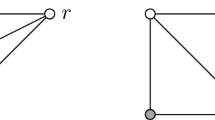Abstract.
Combinatorial optimization games deal with cooperative games for which the value of every subset of players is obtained by solving a combinatorial optimization problem on the resources collectively owned by this subset. A solution of the game is in the core if no subset of players is able to gain advantage by breaking away from this collective decision of all players. The game is totally balanced if and only if the core is non-empty for every induced subgame of it.¶We study the total balancedness of several combinatorial optimization games in this paper. For a class of the partition game [5], we have a complete characterization for the total balancedness. For the packing and covering games [3], we completely clarify the relationship between the related primal/dual linear programs for the corresponding games to be totally balanced. Our work opens up the question of fully characterizing the combinatorial structures of totally balanced packing and covering games, for which we present some interesting examples: the totally balanced matching, vertex cover, and minimum coloring games.
Similar content being viewed by others
Author information
Authors and Affiliations
Additional information
Received: November 5, 1998 / Accepted: September 8, 1999¶Published online February 23, 2000
Rights and permissions
About this article
Cite this article
Deng, X., Ibaraki, T., Nagamochi, H. et al. Totally balanced combinatorial optimization games. Math. Program. 87, 441–452 (2000). https://doi.org/10.1007/s101070050005
Issue Date:
DOI: https://doi.org/10.1007/s101070050005




